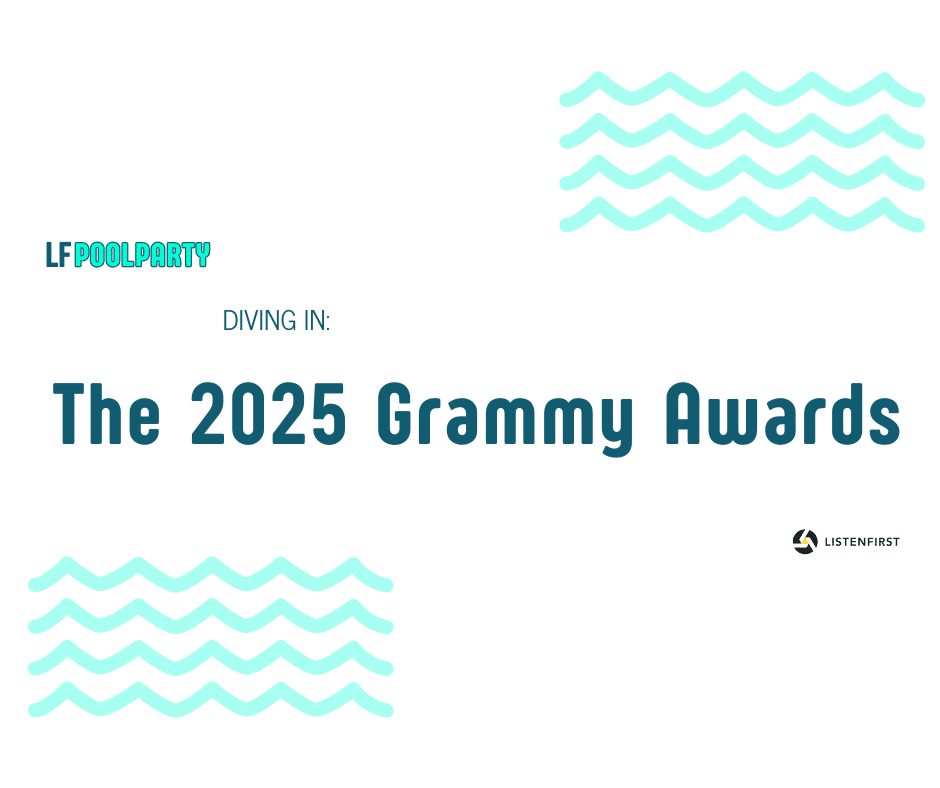
The 2025 Grammy Awards: Key Social Media Insights & The Rise of Influencer Impact
The 67th Grammy Awards reinforced the event’s cultural significance, not just in music but also online. As social media continues to play a crucial role in amplifying major events, this year’s Grammys leveraged consumer-driven content, influencer marketing, and platform-specific strategies to drive unprecedented engagement.
From Beyoncé’s historic wins to the increasing presence of social media influencers shaping viewership, the 2025 Grammys proved that audience participation and digital storytelling are now as important as the awards themselves. Below, we break down the key social media trends that defined this year’s event.
Social Buzz Surged Year Over Year
The 2025 Grammys saw a 6 percent increase in social conversation compared to 2024, pushing total discussion levels 10 percent above the 10-year average. This growth was driven by a mix of high-profile performances, viral red-carpet moments, and unexpected wins, all of which fueled continuous online engagement.
Major awards shows often see fluctuations in engagement depending on the cultural relevance of nominees and performances. This year’s increase indicates that the Grammys continue to hold strong social currency, particularly as more digital-first audiences interact with the event across platforms.
Beyoncé’s Wins Dominated the Conversation
Beyoncé continues to be one of the most influential figures in entertainment, and her presence at this year’s Grammys sparked two of the most-discussed moments of the night. Her win for Best Country Album with Cowboy Carter became the second most talked-about event of the show, following closely behind her Album of the Year victory.
This moment was significant not only because of her massive fanbase but also because of the cultural conversations surrounding genre crossovers and representation in country music. Many fans took to social media to celebrate the historic nature of her win, while others debated the evolving landscape of country music. Regardless of perspective, the data clearly shows that Beyoncé’s presence significantly amplified overall engagement with the Grammys.
A Younger Audience Took Center Stage
This year, the Grammys saw a shift in audience demographics, with engagement among viewers aged 13-24 increasing by 11 percent. This trend suggests that Gen Z played a larger role than ever in driving the social conversation.
Several factors contributed to this shift. First, the rise of newer artists like Raye, Benson Boone, and Chappell Roan created excitement among younger audiences. Second, the use of short-form video content and influencer-led coverage allowed the Grammys to feel more interactive and accessible to Gen Z viewers, who engage primarily through platforms like TikTok, Instagram, and YouTube.
This shift indicates that future award shows must continue to evolve their digital engagement strategies to keep younger audiences invested in the conversation.
The Recording Academy’s Social Presence Skyrocketed
One of the biggest surprises in this year’s data was the 2041 percent increase in conversation surrounding The Recording Academy. This dramatic spike suggests that discussions extended beyond just the winners and performances—people were talking about the Grammys as an institution.
While some of this conversation likely stemmed from excitement over nominees and performances, another major factor was ongoing dialogue about award fairness, snubs, and The Recording Academy’s decision-making process. The Academy has faced criticism in the past, and it’s clear that fans continue to have strong opinions about how artists are recognized.
This level of discussion signals an opportunity for the Grammys to lean further into transparency, audience engagement, and real-time digital interactions to shape the conversation in future years.
Consumer-Driven Content Fueled Engagement
One of the key takeaways from this year’s Grammys was the power of consumer-driven content in amplifying engagement. According to Evan Greene, CMO of The Recording Academy, creating shareable, community-driven moments was a core part of the strategy. This approach helped the event generate over 65 million social media interactions, proving that today’s audiences are not just passive viewers—they want to be part of the experience.
Instead of simply broadcasting content, the Grammys encouraged real-time participation through trending hashtags, interactive posts, and influencer collaborations. By allowing audiences to shape and expand the conversation, the event extended its reach far beyond its initial broadcast.
Authenticity Strengthened Trust and Engagement
Beyond just engagement numbers, authenticity played a significant role in how the Grammys positioned itself on social media. The Recording Academy focused on year-round digital engagement, ensuring that its presence wasn’t limited to just the awards show. By consistently participating in online music conversations and responding to fans, the Academy built credibility and trust, which encouraged more organic interactions when the Grammys aired.
This highlights an important trend: events that establish ongoing dialogue with their audiences—rather than only activating during key moments—are more likely to generate sustained engagement and loyalty.
Influencers Played a Critical Role in Shaping Viewership
One of the most notable shifts in 2025 was the increased role of social media influencers in driving Grammy engagement. The event collaborated with top digital creators such as Monet McMichael, Haley Baylee, and Kai Cenat, who provided real-time reactions, behind-the-scenes footage, and interactive content throughout the night.
These influencers acted as bridges between traditional media and digital-first audiences, particularly younger viewers who engage with content primarily on social platforms. Their coverage helped expand Grammy viewership beyond its core demographic, making the event feel more inclusive and participatory.
This strategy reflects a growing industry trend: influencers are now critical in extending the reach of major events, and their role will likely continue to expand in future years.
The Moments That Drove the Most Conversation
From historic wins to red-carpet buzz, several key moments stood out in online discussions:
- Beyoncé’s Best Country Album win became a defining cultural moment.
- Shakira’s Grammy acceptance speech, where she dedicated her award to immigrants, sparked widespread praise.
- Carin León’s Best Regional Mexican and Tejano Album victory resonated strongly with fans of the genre.
- The Weeknd’s return to the Grammys after previously boycotting the awards stirred debate.
- Fashion remained a dominant topic, with high-profile attendees generating significant engagement, especially on Instagram.
Final Takeaways
The 2025 Grammys demonstrated how social media has completely transformed the way audiences engage with major events. With a younger audience participating more, influencers playing a key role in driving viewership, and authenticity becoming a defining factor in brand trust, the landscape of awards shows is rapidly evolving.
For brands and entertainment organizations, the key lesson is clear: successful digital presence isn’t just about visibility—it’s about fostering real, ongoing connections with audiences. As platforms evolve, so too must the strategies behind engagement. The Grammys embraced this shift in 2025, and the results speak for themselves.
Want more deep dives like this? Make sure to subscribe to our weekly newsletter, LF Pool Party, for everything social media professionals need to know to make their strategy a 10/10.


